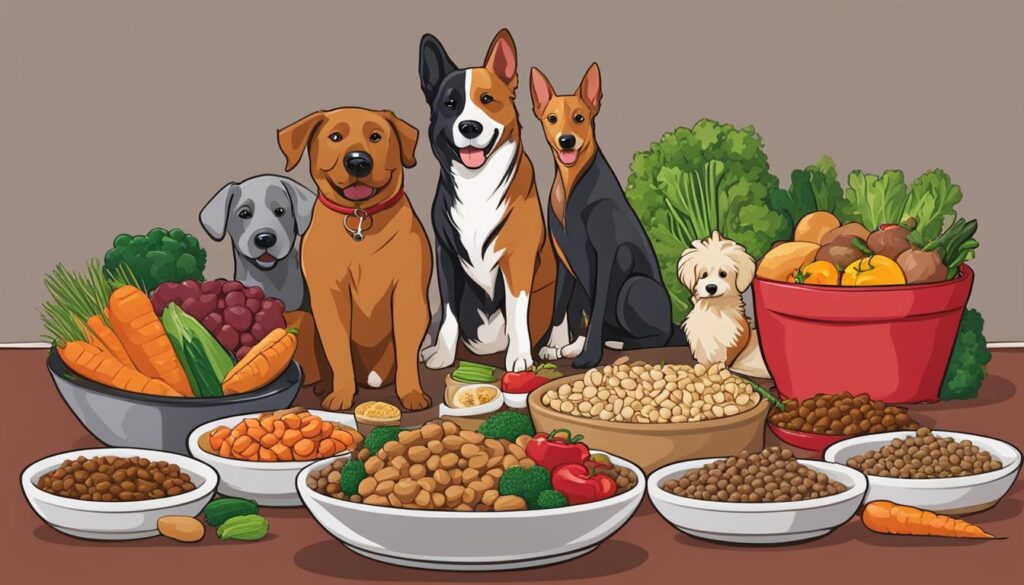Feeding your dog a balanced diet is crucial for their overall health and well-being. Dogs, just like humans, need proper nutrition at every stage of their lives. Whether you have a playful puppy, an active adult, or a wise senior dog, providing them with the right nutrients is key to supporting their growth, development, and vitality.
So, what exactly is a balanced diet for dogs? It’s a diet that includes proteins, fats, carbohydrates, minerals, and vitamins in the right proportions. However, the nutritional requirements vary depending on their life stage. Let’s dive into the specifics of each stage – puppy, adult, and senior – and understand the unique needs of our furry friends.
Puppy Nutrition – Building a Foundation for Growth


Puppies have unique nutritional needs to support their rapid growth and development. Providing a balanced diet is crucial during this stage to ensure they build a strong foundation for a healthy and happy life. Here are some key factors to consider when it comes to puppy nutrition:
Diet Composition
A balanced and nutritious diet for puppies should consist of high-quality, all-natural dog food. Look for a puppy food that contains ample animal-based proteins as the primary ingredient. Protein is essential for muscle development and growth, which is especially important for active and growing puppies. Ensure that the food also includes healthy fats, carbohydrates, vitamins, and minerals to support overall health and vitality.
Feeding Frequency
Puppies have smaller stomachs and faster metabolisms compared to adult dogs. It’s best to feed them three to four meals a day to meet their energy requirements and prevent digestive issues. Dividing their meals into smaller portions throughout the day also helps maintain a steady blood sugar level and prevents excessive hunger between meals.
Consult with a Veterinarian
Every puppy is unique, and their nutritional needs may vary based on factors such as breed, size, and overall health. It’s essential to consult with a veterinarian who can provide personalized recommendations on the ideal diet and feeding routine for your specific puppy. They can assess your puppy’s growth and development, take into account any health concerns, and guide you in choosing the right dog food for your furry friend.
| Benefits of Proper Puppy Nutrition | Risks of Inadequate Puppy Nutrition |
|---|---|
|
|
“Proper nutrition during the puppy stage is instrumental in setting the stage for a lifetime of health and vitality.”
Remember, providing your puppy with the right nutrition during this critical stage of their life is essential for their overall well-being. By understanding their unique nutritional needs and consulting with a veterinarian, you can ensure that your puppy receives the building blocks they need to grow into a healthy adult dog.
Adult Dog Nutrition – Maintaining Health and Vitality
Providing your adult dog with a balanced diet is essential to ensure their overall health and vitality. Adult dogs have different energy requirements compared to puppies and seniors, and their nutritional needs may vary based on factors such as breed, size, activity level, and overall health.
When it comes to adult dog nutrition, it’s important to focus on quality ingredients that provide the necessary proteins, fats, carbohydrates, vitamins, and minerals. Look for dog foods that list real, recognizable, whole-food ingredients as the primary components. Avoid foods with high amounts of fillers and empty calories, as they offer little nutritional value. Always check the Association of American Feed Control Officials (AAFCO) nutritional adequacy statement to ensure that the chosen dog food meets your dog’s daily nutrient requirements.
Feeding Guidelines for Adult Dogs
- Provide appropriate portion sizes based on your dog’s ideal body weight and energy needs, which can be determined by your veterinarian
- Divide the daily food into two or three meals to prevent overeating and aid digestion
- Monitor your dog’s body weight and adjust the food portion accordingly to maintain a healthy weight
It’s important to remember that feeding guidelines provided on dog food packaging are general recommendations and may not apply to every dog. Each dog is unique, so consulting with your veterinarian is essential to tailor a feeding plan that suits your adult dog’s specific needs.


By providing your adult dog with a balanced and nutritious diet, you can support their overall health, energy levels, and longevity. A healthy diet, combined with regular exercise and routine veterinary care, will help your adult dog thrive and enjoy a happy and active life.
Senior Dog Nutrition – Promoting Health in Their Golden Years
As your dog enters their golden years, their nutritional needs may change. Providing them with a balanced diet that promotes their health and well-being is crucial during this stage of their life. Senior dogs have specific requirements to support their aging bodies and to prevent age-related health issues.
One important consideration for senior dogs is the maintenance of lean muscle mass. While their energy requirements may decrease, it’s essential to ensure that their protein intake remains adequate. Higher protein content in their diet can help support muscle health and overall body condition.
Consulting with your veterinarian is key to determining the best diet and feeding regimen for your senior dog. They can provide personalized recommendations based on your dog’s individual needs, including any specific health conditions. Your veterinarian may suggest a diet formulated specifically for senior dogs, which can provide targeted nutrition to support their unique requirements.
| Essential Nutrients for Senior Dogs | Benefits |
|---|---|
| Omega-3 fatty acids | Support joint health and cognitive function. |
| Glucosamine and chondroitin | Help maintain joint health and mobility. |
| Antioxidants | Support immune function and reduce oxidative stress. |
| Probiotics | Aid digestion and promote a healthy gut microbiome. |
Choosing the right diet for your senior dog is crucial in ensuring their health and well-being in their golden years. A balanced diet that meets their specific nutritional needs can help support their aging bodies and prevent age-related issues. Consult with your veterinarian to determine the best diet and feeding regimen for your furry friend.
Common Health Issues in Senior Dogs
Senior dogs are more prone to certain health issues, and proper nutrition can play a vital role in managing these conditions. Some common health issues that may arise in senior dogs include:
- Arthritis and joint problems
- Weight management and obesity
- Dental health issues
- Heart disease
- Kidney and liver disease
- Cognitive decline
Addressing these health issues through a well-balanced diet can help enhance your senior dog’s quality of life and overall health. Your veterinarian can guide you in choosing the right diet and making any necessary adjustments based on your dog’s specific health needs.
Choosing the Right Dog Food – Quality Matters
What to Look for in Dog Food
When it comes to choosing the right dog food for your furry friend, quality should be your top priority. Look for dog foods that contain real, recognizable, whole-food ingredients as the primary ingredients. These foods provide the essential nutrients your dog needs for a balanced diet. Avoid foods that are high in empty calories and fillers, as they offer little nutritional value.
Checking the nutritional adequacy statement by the Association of American Feed Control Officials (AAFCO) is also crucial. This statement ensures that the food meets your dog’s daily nutrient requirements and is formulated to support their specific life stage, such as puppy, adult, or senior. Always opt for dog foods that have undergone rigorous testing and meet industry standards.
Feeding Guidelines for Dogs
Feeding guidelines provided on the packaging of dog food are a good starting point, but it’s important to remember that these are general recommendations. Each dog has individual needs based on factors like their age, size, activity level, and overall health. Consult with your veterinarian to determine the ideal portion sizes and feeding schedule for your dog.
It’s also important to monitor your dog’s weight and adjust their food intake accordingly. Some dogs may require more or less food depending on their metabolism and energy expenditure. Regularly assess your dog’s body condition and consult with your veterinarian if you notice any changes in weight or overall health.
| Life Stage | Protein Needs | Recommended Dog Food |
|---|---|---|
| Puppy | Higher protein requirements for growth | Puppy-specific formulas with increased protein content |
| Adult | Maintenance of lean muscle mass | High-quality dog food with balanced protein levels |
| Senior | Maintain muscle mass and support aging bodies | Senior dog formulas with higher protein content |
Key Dog Food Recommendations
- Choose dog foods with real, recognizable ingredients
- Check the nutritional adequacy statement by AAFCO
- Consider your dog’s specific life stage and nutritional needs
- Consult with your veterinarian for personalized recommendations
- Monitor your dog’s weight and adjust food intake as needed
Remember, your dog’s nutrition plays a vital role in their overall health and well-being. By prioritizing quality and following feeding guidelines tailored to your dog’s needs, you can provide them with the best possible diet to support their growth, energy levels, and longevity.


Conclusion
Understanding dog nutrition for different life stages is crucial for providing optimal care for your furry friend. By feeding your dog a balanced diet that meets their specific nutritional needs at each life stage, you can support their growth, development, and overall health.
Consult with your veterinarian for personalized feeding recommendations and advice on choosing the right dog food for your dog. Remember to prioritize quality when selecting dog food and provide fresh, clean water at all times. Taking care of your dog’s nutrition is an investment in their well-being and can contribute to a long, healthy, and happy life.
So, whether you have a playful puppy, an energetic adult, or a wise senior dog, make sure to provide them with the nutrients they need to thrive. With the right diet and proper care, you can give your furry companion the best chance at a happy and healthy life by their side.
FAQ
What are the nutritional requirements for dogs?
Dogs require a balanced diet that includes proteins, fats, carbohydrates, minerals, and vitamins.
How does puppy nutrition differ from adult dog nutrition?
Puppies have higher caloric, protein, and fat requirements due to their rapid growth and development.
How many meals a day should I feed my puppy?
It’s best to feed puppies three to four meals a day, as they have smaller stomachs and faster metabolisms.
What should I feed my adult dog?
Adult dogs should be fed a balanced diet that contains high-quality proteins, fats, carbohydrates, vitamins, and minerals.
How much food should I feed my adult dog?
The amount of food to feed your adult dog should be based on their ideal body weight and energy needs.
What are the nutritional needs of senior dogs?
Senior dogs have specific nutritional needs to support their aging bodies and maintain lean muscle mass.
What type of dog food should I choose?
Look for dog foods that contain real, recognizable, whole-food ingredients as the primary ingredients.
How do I know if a dog food is nutritiously adequate for my dog?
Check the nutritional adequacy statement by the Association of American Feed Control Officials (AAFCO) on the packaging.
Are feeding guidelines on dog food packaging accurate?
Feeding guidelines provided on the packaging are general recommendations, and individual needs may vary.
Should I consult my veterinarian for personalized feeding recommendations?
Yes, it’s important to consult with your veterinarian for personalized advice on choosing the right dog food and feeding regimen.

